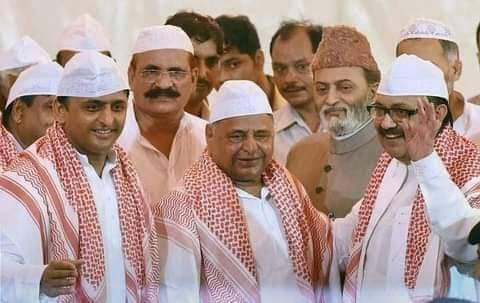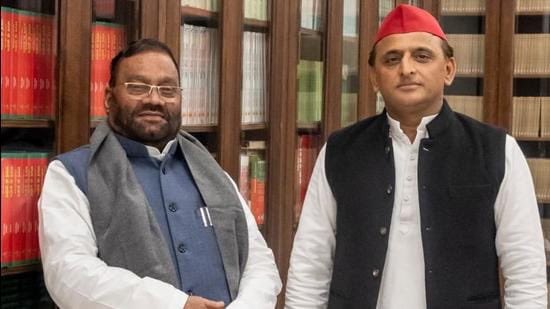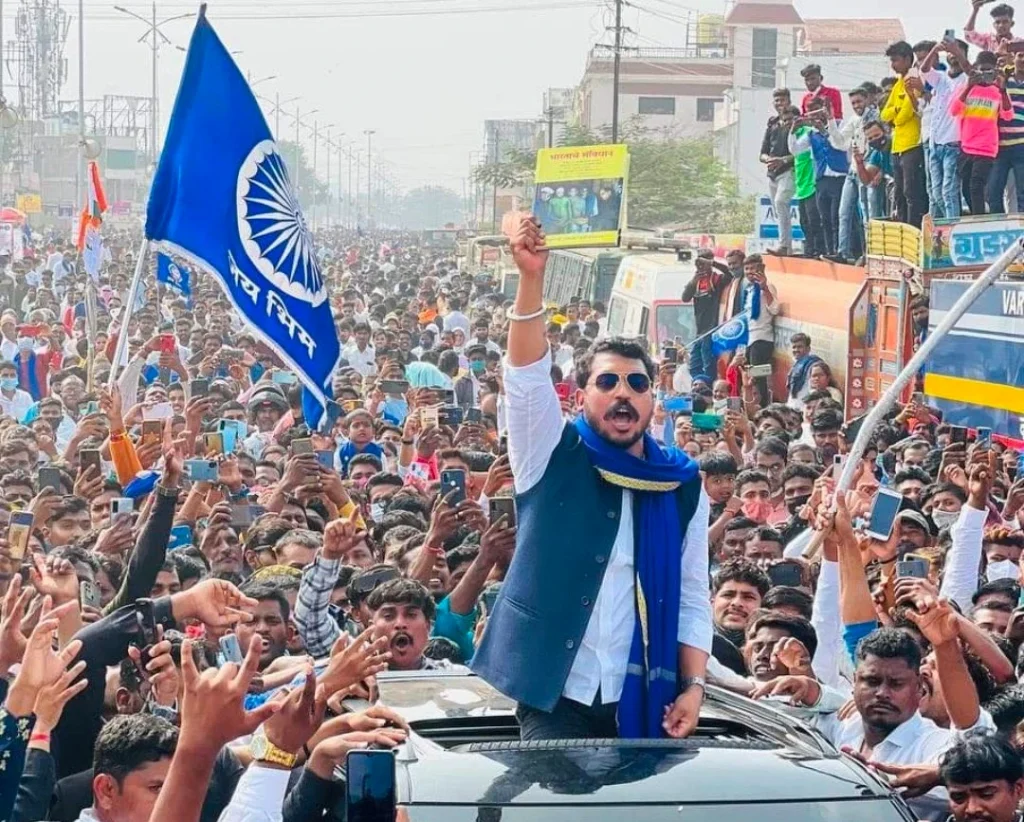Preparations for Uttar Pradesh elections that are slated to happen in seven phases between 10 February to 7 March are in full swing. To win back power, former Chief Minister of the state, Akhilesh Yadav, is tweaking the Samajwadi Party’s (SP) political strategy. His party, which has acquired an image for being reliant on Muslim votes, is actively trying to move away from that rhetoric towards a more caste-based-politics approach.
Reasons for shifting the rhetoric
There are multiple reasons why the SP is looking for this image makeover and picking up caste-based issues over minority religious ones.
The party holds that its earlier avatar – that of an outfit that relied quite extensively on the support of Muslims, second only to the Yadavs – was fueling for the BJP’s Hindutva politics.

In the last couple of months, as the Assembly elections in the state have drawn closer, the party has adopted Hindu appeasement tactics. Akhilesh Yadav himself visited a bunch of Hindu temples, proclaiming quite often that he is a “bigger” and “better” Hindu than the leaders of the Bharatiya Janata Party (BJP). Political analysts have also pointed towards a conscious attempt on Yadav’s part not frequently to share a stage with Muslim leaders.
Some analysts believe that the SP does not have many alternatives in the present situation. It needs to underplay its appeal to Muslims as Hindutva is the dominant trend in electoral politics in the status quo.
Another reason behind embracing this strategy seems to be that Yadav, since 2014, has been facing accusations of being partisan against non-Yadav Other Backward Classes (OBCs). His party is also trying to move away from this electorally unfavourable image.

Most importantly, numbers are a significant influencing factor in this strategy shift. The Axis My India survey for the 2017 assembly elections revealed that 58 per cent of the OBCs voted for BJP, while only 18 per cent voted for the SP. However, 80 per cent of the Yadavs voted for SP. In the 2017 assembly elections, the BJP got 40 per cent of the vote share. Muslims and Yadavs, both groups that form the core voter base of SP, lead it to a 24-25 per cent vote share. Earlier, the party relied on local candidates to get 7-8 per cent of votes. However, since the BJP set the informal 40 per cent benchmark, this amount is not enough.
The realisation that the assembly elections can not be won simply based on support from Muslims and Yadavs has hit the SP. To win, the former CM needs to increase his party’s vote percentage in the state. In such a context, aligning with smaller parties that represent non-Yadav OBCs, who constitute 35 per cent of the OBC population in UP, is likely to benefit the SP.
Another realisation that the party has come to is that the SP’s development rhetoric did not convince the voters in 2017 because of the polarisation that happened along the caste lines, allegedly done by the BJP. Caste politics just seems more effective in that regard.
Rainbow coalition
The caste politics approach has shaped the strategies employed in the pre-election period. In an effort to construct a broad social alliance of backward castes and Dalits, Yadav has accommodated several leaders from the ‘Bahujan’ stream of caste politics.
In his rainbow coalition, called such because of the flag colours of the multiple small parties that Yadav has recently formed an alliance with, several OBC-based parties have support bases amongst the Jat, Kurmi Chauhan, Maurya-Kushwaha, and Rajbhar castes. By themselves, these parties do not have state-wide influence. However, their region-wise performance highlights their importance. Experts are of the opinion that when these outfits work in alliances, they can be a formidable force. Beyond this, political observers have noted that Yadav has also incorporated the language of social justice in his campaign.
If he wins, the Samajwadi chief has promised to conduct a caste census for the OBCs, who are numerically the most dominant bloc in the state. He has also assured the OBC castes that they will have bhagidhari, samman, and haq (representation, honour, and due rights, respectively) as per their population. This terminology is closely linked to the social justice politics in the state. Simultaneously, Yadav has also been attacking the traditional ‘upper caste’ background of the BJP.
In addition to making these efforts to curry favour with the scattered OBC castes, Yadav is also trying to woo the Dalit voters. Dalits comprise 21.5 per cent of UP’s population. The Bahujan Samaj Party (BSP) commands the largest share of this community’s vote – especially the Jatav sub-caste to which BSP leader Mayawati herself belongs.
In a bid to pull this vote bank over to his side, Yadav has added several key Dalit leaders from the BSP to his party over the past three years. Leaders include Inderjeet Saroj, Tribhuvan Dutt, Mithailal Bharti, and Yogesh Verma. OBC leaders such as R.S. Kushwaha, Lalji Verma, and Ram Achal Rajbhar, who propagate Ambedkarite ideology, are also a part of the SP now.
The Samajwadi supremo often evokes BR Ambedkar and reminds crowds of the threat that the reservation and constitutional provisions face due to the privatisation spree under the BJP government to woo the Dalit voters.
Challenges remain
Despite being on track to form a broad-based social alliance focused on the OBC and Dalit voters, a few challenges for the SP remain. Sources in the know think that the biggest challenge for Yadav and his party to win this election is to deconstruct their image as a Yadavs-only group. Several local SP leaders were accused of land grabbing, pooling of tenders, and hooliganism in the past. Yadav will have to convince voters that such actions will not be repeated.

The other challenge to consolidating the Dalit voter bank for SP has come from Bhim Army chief Chandrashekhar Azad. Azad, who was in discussions with Yadav about allying, abruptly ruled out such a possibility on Saturday.
“After all the discussions, in the end, I felt that Akhilesh Yadav does not want Dalits in this alliance; he just wants Dalit vote bank,” he said at a press conference.
The recurring issue of seat-sharing arrangements in an alliance has the potential to be a challenge too.
